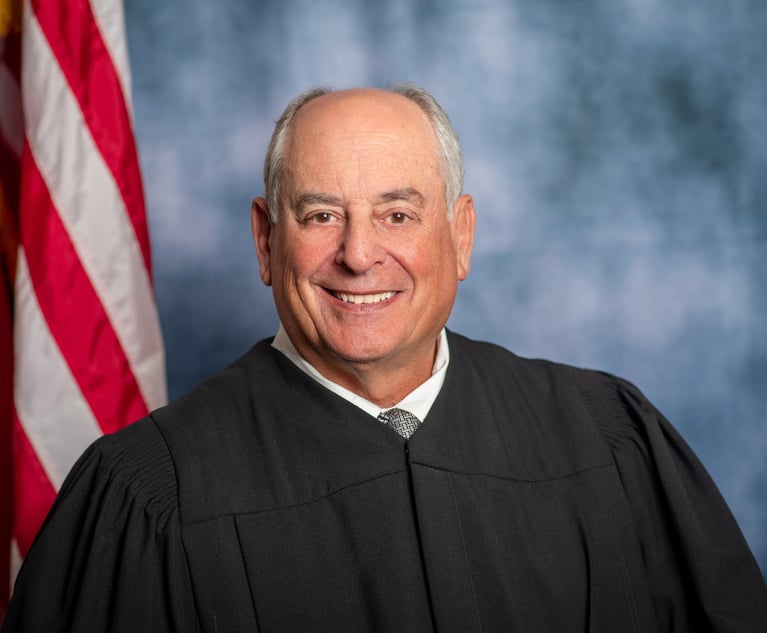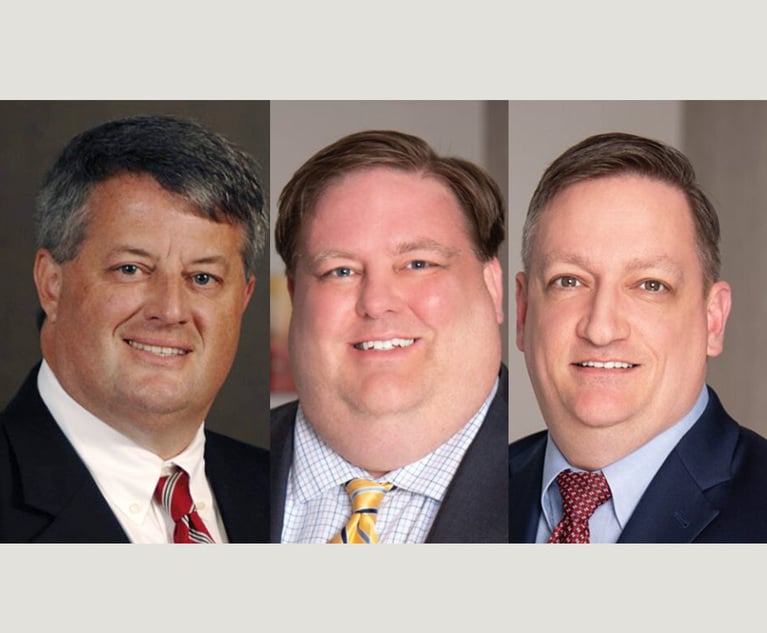 Supreme Court Justice Sonia Sotomayor. (Photo by David Handschuh/ALM)
Supreme Court Justice Sonia Sotomayor. (Photo by David Handschuh/ALM)Sotomayor Says 11th Circuit Is 'Out of Step'
The justice said the Eleventh Circuit's procedures present a "troubling tableau" and questioned whether they are "consistent with due process."
June 12, 2020 at 12:14 PM
3 minute read
Justice Sonia Sotomayor criticized the U.S. Court of Appeals for the Eleventh Circuit as "significantly out of step" with other circuits for the way in which it handles prisoners' requests to file successive habeas challenges to their sentences or convictions.
In a statement accompanying the Supreme Court's denial of review in the case St. Hubert v. United States, Sotomayor said Monday the Eleventh Circuit's procedures present a "troubling tableau" and questioned whether they are "consistent with due process."
The order marked the second time in the span of one week that the justices declined to hear a dispute challenging the Eleventh Circuit's treatment of prisoners' applications that basically seek permission from the circuit court to move forward with their cases. The other petition, Tomlin v. Patterson, challenging the circuit court's handling of "certificates of appeals," was denied review on June 1.
In the Supreme Court petition denied Monday, Michael St. Hubert had sought authorization from the circuit court, as required by federal law, to file a second or successive habeas petition. To be successful, the prisoner must show that the habeas petition will be based either on new evidence sufficient to establish that no reasonable fact-finder would have found the defendant guilty or on a new constitutional rule made retroactive on collateral review.
Sotomayor, contrasting the Eleventh to other circuits, said the Eleventh: publishes "far more" denials of authorization (45 from 2013-2018 compared to 80 from all circuits combined); mandates a decision within 30 days; requires prisoners to state their legal argument on a form with space for fewer than 100 words; does not grant oral argument in noncapital cases; generally does not require briefs from the prisoner or government; and often decides the merits of the habeas claims when the circuit court is only to decide whether the prisoner's application meets the authorization requirements.
"Surprisingly still," Sotomayor wrote, the circuit court has published a number of authorization denials stating that all future litigants, even those on direct appeal, are bound by the orders until overruled by the en banc court or the Supreme Court.
In opposing review, U.S. Solicitor General Noel Francisco said some members of the circuit court "expressed concerns" about publishing and giving precedential weight to certain denials of authorization.
"Yet, in the course of those opinions, no member of the court addressed the possible application of the Due Process Clause," Francisco told the justices. "Given the court of appeals' active internal deliberation about the proper treatment of published orders on applications for leave to file second or successive Section 2255 motions, that court should decide in the first instance whether or to what extent due process principles should affect the court's approach."
Sotomayor ultimately agreed with the government's recommendation. "The Eleventh Circuit has not yet appeared to address a procedural due process claim head on, so I will leave it to that court to consider the issue in the first instance in an appropriate case," Sotomayor wrote. "In the meantime, nothing prevents the Eleventh Circuit from reconsidering its practices to make them fairer, more transparent, and more deliberative."
This article first appeared in the Supreme Court Brief, a Daily Report affiliate.
This content has been archived. It is available through our partners, LexisNexis® and Bloomberg Law.
To view this content, please continue to their sites.
Not a Lexis Subscriber?
Subscribe Now
Not a Bloomberg Law Subscriber?
Subscribe Now
NOT FOR REPRINT
© 2025 ALM Global, LLC, All Rights Reserved. Request academic re-use from www.copyright.com. All other uses, submit a request to [email protected]. For more information visit Asset & Logo Licensing.
You Might Like
View All
North Carolina Courts Switch to Digital, Face Extreme Weather in 2024

'A 58-Year-Old Engine That Needs an Overhaul': Judge Wants Traffic Law Amended
3 minute read
Fulton Jury Returns Defense Verdict After Pedestrian Killed by MARTA Bus
8 minute read
'The Best Strategy': $795K Resolution Reached in Federal COVID-Accommodation Dispute
8 minute readTrending Stories
- 1The Fearless Forecaster’s Employment Law Predictions for 2025
- 2Judicial Conference Declines Democratic Request to Refer Justice Thomas to DOJ
- 3People in the News—Jan. 2, 2025—Eastburn and Gray, Klehr Harrison
- 4Deal Watch: Latham, Paul Weiss, Debevoise Land on Year-End Big Deals. Plus, Mixed Messages for 2025 M&A
- 5Bathroom Recording Leads to Lawyer's Disbarment: Disciplinary Roundup
Who Got The Work
Michael G. Bongiorno, Andrew Scott Dulberg and Elizabeth E. Driscoll from Wilmer Cutler Pickering Hale and Dorr have stepped in to represent Symbotic Inc., an A.I.-enabled technology platform that focuses on increasing supply chain efficiency, and other defendants in a pending shareholder derivative lawsuit. The case, filed Oct. 2 in Massachusetts District Court by the Brown Law Firm on behalf of Stephen Austen, accuses certain officers and directors of misleading investors in regard to Symbotic's potential for margin growth by failing to disclose that the company was not equipped to timely deploy its systems or manage expenses through project delays. The case, assigned to U.S. District Judge Nathaniel M. Gorton, is 1:24-cv-12522, Austen v. Cohen et al.
Who Got The Work
Edmund Polubinski and Marie Killmond of Davis Polk & Wardwell have entered appearances for data platform software development company MongoDB and other defendants in a pending shareholder derivative lawsuit. The action, filed Oct. 7 in New York Southern District Court by the Brown Law Firm, accuses the company's directors and/or officers of falsely expressing confidence in the company’s restructuring of its sales incentive plan and downplaying the severity of decreases in its upfront commitments. The case is 1:24-cv-07594, Roy v. Ittycheria et al.
Who Got The Work
Amy O. Bruchs and Kurt F. Ellison of Michael Best & Friedrich have entered appearances for Epic Systems Corp. in a pending employment discrimination lawsuit. The suit was filed Sept. 7 in Wisconsin Western District Court by Levine Eisberner LLC and Siri & Glimstad on behalf of a project manager who claims that he was wrongfully terminated after applying for a religious exemption to the defendant's COVID-19 vaccine mandate. The case, assigned to U.S. Magistrate Judge Anita Marie Boor, is 3:24-cv-00630, Secker, Nathan v. Epic Systems Corporation.
Who Got The Work
David X. Sullivan, Thomas J. Finn and Gregory A. Hall from McCarter & English have entered appearances for Sunrun Installation Services in a pending civil rights lawsuit. The complaint was filed Sept. 4 in Connecticut District Court by attorney Robert M. Berke on behalf of former employee George Edward Steins, who was arrested and charged with employing an unregistered home improvement salesperson. The complaint alleges that had Sunrun informed the Connecticut Department of Consumer Protection that the plaintiff's employment had ended in 2017 and that he no longer held Sunrun's home improvement contractor license, he would not have been hit with charges, which were dismissed in May 2024. The case, assigned to U.S. District Judge Jeffrey A. Meyer, is 3:24-cv-01423, Steins v. Sunrun, Inc. et al.
Who Got The Work
Greenberg Traurig shareholder Joshua L. Raskin has entered an appearance for boohoo.com UK Ltd. in a pending patent infringement lawsuit. The suit, filed Sept. 3 in Texas Eastern District Court by Rozier Hardt McDonough on behalf of Alto Dynamics, asserts five patents related to an online shopping platform. The case, assigned to U.S. District Judge Rodney Gilstrap, is 2:24-cv-00719, Alto Dynamics, LLC v. boohoo.com UK Limited.
Featured Firms
Law Offices of Gary Martin Hays & Associates, P.C.
(470) 294-1674
Law Offices of Mark E. Salomone
(857) 444-6468
Smith & Hassler
(713) 739-1250






